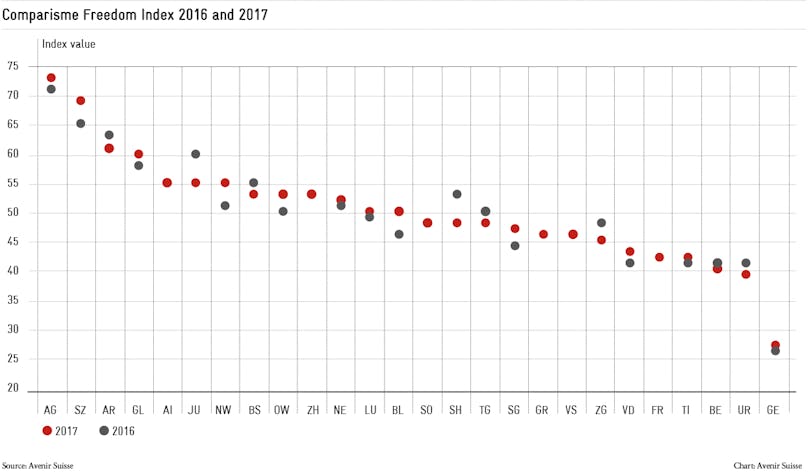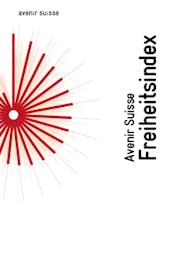Avenir Suisse’s freedom index measures the economic and civil liberties in the cantons. Since 2009, the canton of Aargau takes the lead and continues to defend its first place. In total, it earned two more points than the previous year (73 points instead of 71). The canton stands out again with a compelling combination of economic and civil liberties: it ranks second for the two sub-indices. Schwyz also manages to maintain its second place, even though the gap with the Aargau has narrowed. With regard to civil liberties, the canton of Jura is once again the undisputed winner. Appenzell Outer Rhodes also retains its place on the podium, going from 63 to 61 points. With 60 points, Glaris just missed qualifying among the first three cantons offering the most liberties.
Basel-Country: a discrete progression
It is in the middle of Avenir Suisse’s freedom index ranking that the biggest changes occurred. The cantons of Vaud, St. Gallen, Nidwalden, Solothurn and Obwalden are among the winners of this year’s ranking. For the first time since 2009, Obwalden is once at the top 10 of the freedom index. However, Basel-Country accomplished the greatest leap forward. With significant improvements in decentralization and public safety, as well as slight improvements in cantonal finances, it was able to win six places compared to 2016. The canton of Basel-Country now holds the 13th position.
However, the cantons of Jura, Schaffhausen, Thurgau, Zug and Ticino were among this year’s losers in the freedom index. Ticino fell abruptly due to strict regional regulation of the labor market and the prohibition of the burqa; it now ranks 23rd.

Geneva: quo vadis?
The canton of Geneva is last in Avenir Suisse’s freedom index since 2009, thus considered as the least liberal canton in Switzerland. Compared to previous years, Geneva nevertheless progressed in certain indicators and thus managed to obtain an extra point, achieving a score of 27 points. This allowed it to slightly decrease the gap with the penultimate canton Uri. This positive development is largely explained by a strong improvement in the indicator relating to the time span for building permits (that nevertheless remains well below the national average on an inter-cantonal comparison).
Fewer differences between the cantons
In this year’s freedom index, it is striking to observe that the cantons are closer to each other in terms of points than in 2016 (see figure). This is especially true for the middle of the rankings, where small differences are enough to change the classification. In this context, it is gratifying to observe that several cantons are more open to liberties: higher scores than in 2016 were achieved by top-ranking cantons (AG, SZ), as well mid-ranking cantons (LU, NE , BL or SG).
The main drive of this evolution are the indicators: ” Time-span to obtain a building permit”, “Public safety” and “Equilibrium of cantonal finances.” The indicator for public safety has improved in many cantons, particularly in Appenzell Inner Rhodes. The average waiting time to obtain a building permit has been lowered in many cantons, including Appenzell Outer Rhodes, Geneva, Neuchâtel, Schwyz and Graubünden, all of which have shown a clear improvement in this area. Lastly, 14 cantons registered a better performance than in 2016 in terms of equilibrium of cantonal finances.
Other indicators have remained relatively stable, except for the degree of decentralization. In this area, a third of cantons recorded lower results than the previous year, which suggests that the subsidiarity principle has weatherd. A trend towards centralization is emerging; this is worth bearing in mind in a liberal perspective.
As before, the freedom index remains an interactive online tool that can be used to create a personalized index freedom because everyone has their own definition of freedom.
Links to download the evaluation of different cantons (pdf)
Aargau, Appenzell Ausserrhoden, Appenzell Innerrhoden, Basel-Stadt, Bern, Freiburg (D)/ Friborg (F), Geneva (F), Glarus, Graubünden, Jura (F), Luzern, Neuchâtel (F), Nidwalden,Obwalden, Schaffhausen, Schwyz, Solothurn, St. Gallen, Ticino (D), Ticino (I), Thurgau, Uri, Vaud (F), Wallis (D), Valais (F), Zug, Zürich






